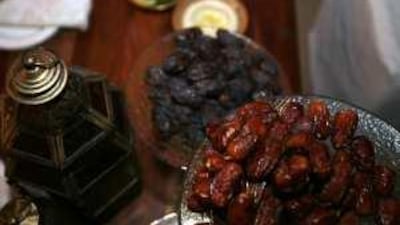Many people keep telling me: "So you guys fast and have iftar. Sure, we hear about suhoor, but that's still just two meals, and that can't be healthy." But who said we have only one or two meals? The Prophet Mohammed actually advised us to eat three meals just like a normal day. We are supposed to be modest at our iftar, not stuff ourselves until we can't breathe. Then we should have space for the second meal, which is like our regular dinner the rest of the year. The third meal is the suhoor. We know if we don't have a proper suhoor, our blood pressure might drop, which isn't a great idea when it's this hot. Many Muslims forget that suhoor is supposed to be taken sometime before imsak, just an hour or half an hour before we fast, and not at midnight, as that's a long time to go without water or food. The Prophet Mohammed said suhoor has baraka (blessings), and he encouraged it. If you are devoted to Islam you should have no difficulty going to sleep at midnight and waking up early in the morning, around 2.30am or 3am to have suhoor. It could be the iftar leftovers or anything light, but just have something. Your stomach will thank you and your energy will be boosted for the day. Not to mention how amazing it is when your mother and father and brothers and sisters all wake to share a meal and wish each other a good day of fasting and sweet dreams. Anyone up for a suhoor meal with me?
Imsak is the period when we are not supposed to ingest food or drink, but it doesn't begin at sunrise as some people assume. The Prophet Mohammed recommended fasters eat suhoor close to imsak, so that fasting is not a burden on the body, but to stop about 10 minutes before the call to the fajr (dawn) prayer. This amount of time equals the time it would take to read 50 verses of the Quran, which is what the Prophet Mohammed did between suhoor and fajr, according to Zaid ibn Thabit, his personal scribe. This is not a requirement, but rather a recommendation or sunnah, based on what the Prophet did. If a person is doubtful whether imsak has begun, he should refrain from eating or drinking if he intends to fast that day. The exact timing is also available below, in this wonderful newspaper's Ramadan corner. The word imsak, by the way, is derived from the word "mask", which means to hold something, embrace it tightly or refrain from it, as in to hold your anger.

